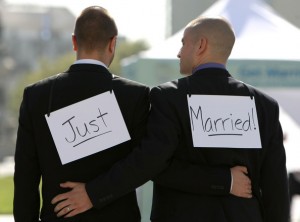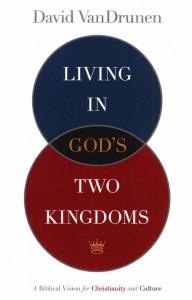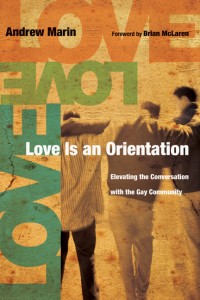Thoughts on Sodom, the Same-Sex Marriage Debate, & Kingdom Theology
 From time to time my church runs a type of ‘think tank,’ lead by a member of staff. We discuss culture, ethics and the Christian worldview, along with our approach to the secular world. A few weeks back we considered the same-sex marriage debate. I do realise that this is much more than a topical debate for many and because of its sensitive (as well as volatile) nature I encourage generous reading. I have written previously on the topic of homosexuality, here, but I am always hesitant to because of the milieu of warring factions and wounded people. So by way of preface, let me say that this post is an attempt to answer whether Christians should impose a Christian sexual ethic on our governments or culture, those outside the auspices of the church and Christ’s lordship.
From time to time my church runs a type of ‘think tank,’ lead by a member of staff. We discuss culture, ethics and the Christian worldview, along with our approach to the secular world. A few weeks back we considered the same-sex marriage debate. I do realise that this is much more than a topical debate for many and because of its sensitive (as well as volatile) nature I encourage generous reading. I have written previously on the topic of homosexuality, here, but I am always hesitant to because of the milieu of warring factions and wounded people. So by way of preface, let me say that this post is an attempt to answer whether Christians should impose a Christian sexual ethic on our governments or culture, those outside the auspices of the church and Christ’s lordship.
As many discussions on homosexuality often tend to go, someone reached back into the Old Testament and brought up – ‘brought out’? – Sodom and Gomorrah (Genesis 19). ‘These events clearly show that homosexual relations signify the near death and utter derailment of society; Sodom and Gomorrah had to be wiped out. And the unruly time of Judges ends up at this same dire situation: homosexuals run rampant, indicating that society is all but lost (Judges 19).’ But is that really what these passages are about? Do these two instances pinpoint homosexuality as the terminus of a godless society? A terminus which we should attempt to spare our society from? To put it crudely, quoting Kim Fabricius, both incidents are “about gang-bangs”. If one turns up Ezekiel 16:49-50 these debauched events are brought into clearer light. As Andrew Marin says, “[they] are described as overfed, unconcerned, nonjustice-minded people who tried to potentially and literally rape their guests”. These passages are not directly addressing the issue of homosexuality. Though, I do believe they model people who did not know Yahweh or had wandered far into idolatry.
 Their idolatry had carried them into unrighteousness, godless orgies, and passionate inhospitality, a fair description of culture through history. Idolatry, the worshiping of other gods – along with or apart from Yahweh – was the root cause not only of their immorality but also their judgment. Jesus’ words to his disciples in Matthew 11 thunder loudly against those who would use these stories to argue that we should save our society from sin by imposing regulative Scriptural ethics. To quote our Lord, “It will be more bearable for Sodom on the day of judgment than for you” (11:24), ‘you’ being those who did not repent at the preaching of the kingdom of God (11:20), the heralding of Jesus the Messiah (11:2). Where does this leave us? To exaggerate the implication of our desire to impose Christian ethics on our secular society: we should lobby against religious freedom. Surely our biggest concern should align with Jesus’. In which case let us not go halfway in merely enforcing biblical sexual ethics; let us demand allegiance to Christ our Lord and remove the space for idolatrous beliefs and religions.
Their idolatry had carried them into unrighteousness, godless orgies, and passionate inhospitality, a fair description of culture through history. Idolatry, the worshiping of other gods – along with or apart from Yahweh – was the root cause not only of their immorality but also their judgment. Jesus’ words to his disciples in Matthew 11 thunder loudly against those who would use these stories to argue that we should save our society from sin by imposing regulative Scriptural ethics. To quote our Lord, “It will be more bearable for Sodom on the day of judgment than for you” (11:24), ‘you’ being those who did not repent at the preaching of the kingdom of God (11:20), the heralding of Jesus the Messiah (11:2). Where does this leave us? To exaggerate the implication of our desire to impose Christian ethics on our secular society: we should lobby against religious freedom. Surely our biggest concern should align with Jesus’. In which case let us not go halfway in merely enforcing biblical sexual ethics; let us demand allegiance to Christ our Lord and remove the space for idolatrous beliefs and religions.
 But there is another question, which in my opinion bears significantly on this discussion: the two-kingdoms debate. Having recently read a few titles from N.T. Wright and David VanDrunen’s Living in God’s Two Kingdoms I realised that the conversation about Christianity and culture shares massive points of contact with the same-sex marriage debate. I appreciate that those belonging to both positions possess a more nuanced theology than those summarised from Wright and VanDrunen and outlined (below). But for the sake of the larger question at hand I will favour reductionism.
But there is another question, which in my opinion bears significantly on this discussion: the two-kingdoms debate. Having recently read a few titles from N.T. Wright and David VanDrunen’s Living in God’s Two Kingdoms I realised that the conversation about Christianity and culture shares massive points of contact with the same-sex marriage debate. I appreciate that those belonging to both positions possess a more nuanced theology than those summarised from Wright and VanDrunen and outlined (below). But for the sake of the larger question at hand I will favour reductionism.
Wright – a major proponent of the redemptive transformation of culture, or the one-kingdom approach – argues that Jesus inaugurated God’s kingdom and that the kingdom project is continued by Christians bearing witness to Jesus’ lordship and holding authorities accountable to it (p223, Simply Jesus). While we do not oppose everything that the government does we must critique, denounce, and speak up where need be (p224). That is how Jesus exercises his sovereignty today and makes his kingdom a reality.
On the other hand we have the two-kingdoms approach, which distinguishes between the Noahic and Abrahamic covenants, the common and redemptive kingdoms. Within this view it is held that we do not impose Scripture’s authority onto the common kingdom for the church must tend to its God-given business in announcing God’s salvation (p31, Living in God’s Two Kingdoms). Despite VanDrunen’s attempt to have his cake and eat it, in his discussion on politics (p194-203), politics belong undeniably within the realm of the common kingdom (p194). This must mean that in matters of ethics and the authority of Scripture we cannot justify imposing Christian morality and norms. Misty Irons helpfully reminds us that Christ’s lordship is the very reason we can submit to the government, Christian or not. She strongly challenges the devotion of our energies into legislating the Bible. She is, I think, much more consistent in praxis with her two-kingdoms theology than VanDrunen is with his.
 So what is our place in the debate? Before anything else we need to figure out whether we hold to the redemptive view of culture or belong to the redemptive kingdom. And to potentially disregard the question entirely, having recently read Andrew Marin’s book, Love is an Orientation, I am convinced our primary role in the world is not legislation. Nor is it retreat. It is gospel proclamation. Andrew Marin says, “The way forward with the GLBT community is not a debate on the Bible’s statements about same-sex sexual behavior but a discussion of how to have an intimate…relationship with the Father and Judge.” If we wish to speak out then we should take the line Justin Welby recently did, and many others have: ask what is best for society at large. Will a redefinition of marriage undermine families as the base communities and cornerstone of society, a normative place for child rearing, and the idea of marriage as a covenant? That is a question for another blog post.
So what is our place in the debate? Before anything else we need to figure out whether we hold to the redemptive view of culture or belong to the redemptive kingdom. And to potentially disregard the question entirely, having recently read Andrew Marin’s book, Love is an Orientation, I am convinced our primary role in the world is not legislation. Nor is it retreat. It is gospel proclamation. Andrew Marin says, “The way forward with the GLBT community is not a debate on the Bible’s statements about same-sex sexual behavior but a discussion of how to have an intimate…relationship with the Father and Judge.” If we wish to speak out then we should take the line Justin Welby recently did, and many others have: ask what is best for society at large. Will a redefinition of marriage undermine families as the base communities and cornerstone of society, a normative place for child rearing, and the idea of marriage as a covenant? That is a question for another blog post.